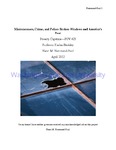Misdemeanors, Crime, and Police: Broken Windows and America's Poor

View/
Author
Hammond-Paul, Henri M.
Subject
Washington and Lee University, Shepherd Poverty Program
Poverty
Neighborhoods
Crime
Criminal statistics
Legal assistance to the poor
Metadata
Show full item recordDescription
Capstone; [FULL-TEXT FREELY AVAILABLE ONLINE] This paper studies broken windows policing theory and its impact on the poor. Broken windows policing, through the collateral consequences of its arrests and convictions, further marginalizes an already marginalized poor population. This paper evaluates the collateral damage of a common policing practice in the United States that relies on high volume arrests, charging, and sentencing of misdemeanor crimes. It considers the connection between this policy and the cyclicality of crime and poverty. It studies the birth and widespread adoption of the aggressive broken windows policing theory. It considers the impacts of these seemingly harmless punishments for minor crimes, and discovers that the long term effects of a misdemeanor charge and conviction can be devastating for individuals, especially those who fall into lower socioeconomic brackets. Last, it considers policy and institutional reforms that will positively affect the status of crime, poverty, and community in the U.S. Henri M. Hammond-Paul